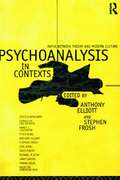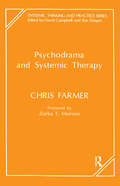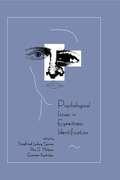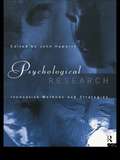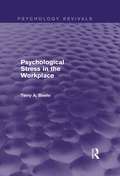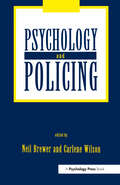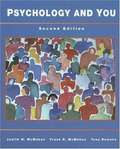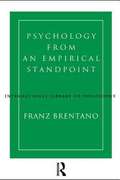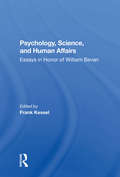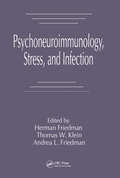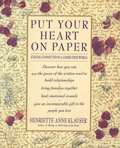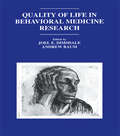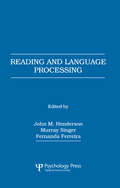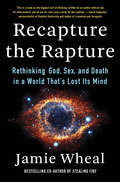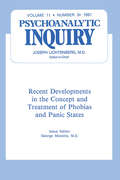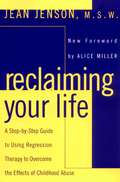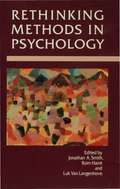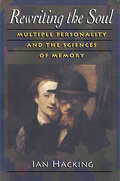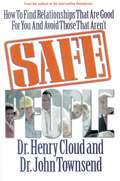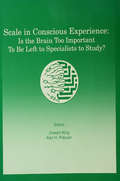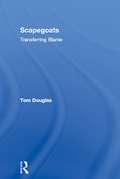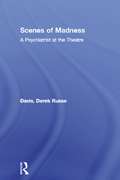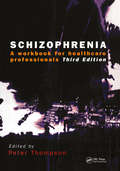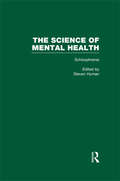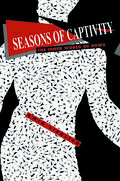- Table View
- List View
Psychoanalysis in Context: Paths between Theory and Modern Culture
by Anthony Elliott Stephen FroshDuring the last decade and a half there have been dramatic changes in psychoanalytic theory, as well as in cultural, social and political theory. Psychoanalysis in Contexts examines these changes and explores the relationship between psychoanalysis and theory. The volume brings together leading scholars and practitioners in psychoanalysis to develop a unique rethinking of the relations between subjectivity and inter-subjectivity, sexual difference and gender power, and unconscious desire and political change. Psychoanalysis in Contexts creates a dialogue between different psychoanalytic approaches to the study of subjectivity, social action and modern societies. It will be essential reading for everyone interested in the future direction of psychoanalytic and cultural theory.
Psychodrama and Systemic Therapy (The Systemic Thinking and Practice Series)
by Chris FarmerIt is now increasingly recognized that psychodrama provides a valid and useful tool in many different contexts; equally, practitioners in a wide variety of fields are acknowledging the benefits that a systems thinking approach can bring to their work. This book unites the two by describing the author's work over a number of years. The author provides a lucid exposition of his own systemic approach to psychodrama, both theoretically and in practical clinical terms. The final section, which discusses systemic approaches to psychiatric care in general, puts the book in a wider context, and will make it of interest to a wide range of mental health professionals.
Psychological Issues in Eyewitness Identification
by Siegfried Ludwig Sporer Roy S. Malpass Guenter KoehnkenWhy do police officers, investigators, prosecutors, judges, and others with an interest in eliciting accurate memory-based testimony need to inform themselves of the research literature in experimental psychology that addresses the question of witness memory? The answer is straightforward, from the perspective of a simple cost/benefit analysis. As with so many matters in the administration of public funds, effectiveness holds important rewards. Those who investigate crimes and decide which line of investigation to pursue and which line to postpone or set aside, necessarily make judgments about the likely guilt of suspects based on the information at hand. If they can make these judgments with a high degree of accuracy, everyone benefits. For many cases eyewitness identification is an important component of evidence, prosecution, and plea negotiation. If witness identification is correctly implemented, investigators and prosecutors can make their judgments effectively, and focus their resources more efficiently. A major component of effectiveness requires avoiding expending scarce resources on erroneous prosecutions. It is in everyone's interest to make the best use of the memory of witnesses: to preserve it without changing it; to render it maximally accessible; to provide an environment in which witnesses feel free to report their recollections; and to accurately assess the probable validity of the witness's report, regardless of the witness's certainty or doubts about its accuracy. This volume gathers evidence from various research domains on eyewitness testimony. Although many of the studies discussed deal with eyewitness identification, it is noteworthy that many of them also touch upon other areas of concern to eyewitness researchers, including chapters on: *voice recognition by humans and computers, with particularly detailed instructions on conducting voice "lineup," *differential aspects of recognition memory in children, *elderly eyewitness' memory, *problems of cross-racial identification, *psychological aspects of facial image reconstruction techniques, *person descriptions, *particular benefits of reinstating context as a means to improve eyewitness memory, *problems associated with various research paradigms in the eyewitness arena, and *recommendations on how to conduct lineups and photospreads and their proper evaluation. Differentiated from other literature on this topic by its non-technical language and accessibility to non-professionals, this volume covers a great deal of ground, raises a host of questions, settles some others, and points the way to more effective use and evaluation of what eyewitnesses have to say.
Psychological Research: Innovative Methods and Strategies
by John HaworthStarting a research project, however large or small can be a daunting prospect. New researchers can be confronted with a huge number of options not only of topic, but of conceptual underpinning. It is quite possible to conduct research into say, memory, from a number of research traditions. Psychology also has links with several other disciplines and it is possible to utilise their techniques; the difficulty is quite simply the wide variety of methodological approaches that psychological research embraces. In this collection, authors have been recruited to explain a wide range of different research strategies and theories with examples from their own work. Their successes as well as the problems they encountered are explained to provide a comprehensive and practical guide for all new researchers. The collection will be a great help to undergraduates about to start final year projects and should be required reading for all those thinking of graduate level research.
Psychological Stress in the Workplace (Psychology Revivals)
by Terry A. BeehrOriginally published in 1995, this book was the most up-to-date and comprehensive account of research on occupational stress at the time. It identifies the sources, consequences and treatments of stress in the workplace from the perspective of organizational psychology and makes clear recommendations for future work in this area. Terry Beehr discusses how role ambiguity and conflict act as stressors in the workplace, and discusses the characteristics of the job and the organization itself that can adversely affect performance. He examines the effects of stress in the workplace and describes methods that can be used to alleviate the problem, both at the individual and organizational level. In addition, the book is illustrated with many examples from field research over the author’s twenty years of experience in studying the workplace. This book will be of considerable interest to students and researchers in occupational psychology, as well as managers and trainers. Terry Beehr is still working in this field today.
Psychology and Policing
by Neil Brewer Carlene WilsonPsychological theory and research have much to contribute to the knowledge and skill bases underlying effective policing. Much of the relevant information, however, is dispersed across a variety of different psychological and criminal justice/policing journals and seldom integrated for those applied psychologists interested in policing issues or for police policymakers/administrators and others working in the criminal justice area who are not familiar with the psychological literature. Designed to accommodate the needs of these different groups, this book addresses both operational policing issues and issues relevant to the improvement of organizational functioning by providing integrative reviews of psychological theory and research that deal with effective policing. It illustrates how the theory and research reviewed are relevant to specific policing practices. These include eyewitness testimony, conflict resolution, changing driver behavior, controlling criminal behavior, effective interviewing, and techniques of face reconstruction. The volume's readable style makes it accessible to a diverse audience including undergraduate and postgraduate students in forensic/organizational/applied psychology, criminal justice, and police science programs, and police administrators and policymakers. It will also interest psychologists whose primary focus includes policing and criminal justice issues. The book should draw attention to the often unrecognized and valuable contribution that mainstream psychology can make to the knowledge base underpinning a wide variety of policing practices.
Psychology and You (2nd edition)
by Tony Romano Frank B. Mcmahon Judith W. McmahonFor most people, a psychologist is someone who sits across from you, listens to your problems, and tries to help. There are more than 100,000 psychologists in the United States, and roughly a third do in fact deal with personal problems. But that leaves two-thirds of the group doing something else.
Psychology from an Empirical Standpoint
by Franz BrentanoFranz Brentano's classic study Psychology from an Empirical Standpoint was the most important of Brentano's works to be published in his lifetime.The author is able to show how Brentano has emerged since the 1970s as a key figure in both contemporary European and Anglo-American traditions and crucial to any understanding the recent history of philosophy and psychology. Edited by Oskar Kraus and translated by Linda L. McAlister.
Psychology, Science, And Human Affairs: Essays In Honor Of William Bevan
by Frank Kessel Norman Garmezy Richard Trumbull Michael SokalThese original essays, written by prominent scholars, pay tribute to the work of William Bevan. In the course of his distinguished career, Bevan has exhibited an almost unique capacity to focus a clear-eyed, critical gaze on operating assumptions and actions—his own and those of others—and to initiate consequential, constructive steps forward, both
Psychoneuroimmunology, Stress, and Infection
by Herman Friedman Thomas W. Klein Andrea L. FriedmanPsychoneuroimmunology is the emerging science devoted to studying the two-way relationship between the nervous and immune systems. Psychoneuroimmunology, Stress, and Infection highlights the latest information concerning microbial infections in both man and animals as related to stress and especially stress hormones.The volume focuses on psychoneuroimmunology as it impacts the immune system in general and also the relationship between neurological events which influence susceptibility and/or resistance to infectious agents such as bacteria, fungi and viruses, as well as parasites. Prominent researchers describe the involvement of the hypothalamus-pituitary-adrenal (HPA) axis on immunity as a function of the nervous system. The text discusses hormones such as prolactin and growth hormone and steroid induced susceptibility to infection and neuropeptides, including vasoactive intestinal peptide, and substance P. The effects of catacholamines on immunity and susceptibility to infection are also covered. This reference also details the involvement of immune cells in the synthesis of neuropeptides, including hormones and endorphins, their effect on the brain as well as the effects of interleukins and tumor necrosis factor on the central nervous system. The book concludes with an interesting look at the relationship between aging, psychoneuroimmunology, and infection. Although there is much new knowledge concerning the nature and mechanism of immune responses, including the mediators involved, Psychoneuroimmunology, Stress, and Infection also presents important discussions and reviews that are long overdue and provide a major contribution to the area of biomedical knowledge in general and psychoneuroimmunology in particular.
Put Your Heart on Paper: Staying Connected In A Loose-Ends World
by Henriette Anne KlauserPut Your Heart On Paper is filled with the inspiring true stories of what happens when people write from their hearts: the shared insights, the new beginnings, the dreams that miraculously come true. In 50 provocative short chapters, acclaimed author Henriette Klauser shows the power of the written word in everyday life -- bringing together parents and children, strengthening personal bonds, mending hurt feelings, solving problems, sharing joys, preserving family history -- and offers tools and tips to get you started right away. Putting your heart on paper does not require special talent, a lot of time or training. All you need is a willingness to be yourself and to be open with others. Nauser's energizing examples show how to get going and keep going past the fear and doubt -- and offer dozens of ideas to try. From a note tucked in a lunchbox to an interactive journal, from love letters to apologies to a three-minute poem, Put Your Heart On Paper shows us how to find a direct line from our deepest thoughts to another's heart.(From the Trade Paperback edition.)
Quality of Life in Behavioral Medicine Research (Perspectives on Behavioral Medicine Series)
by Joel E. Dimsdale Andrew BaumThe number of, and interest in, quality of life studies has grown dramatically in the last decade. On an ever increasing basis, patients, clinicians, researchers, and health policy regulators are considering quality of life in assessing treatment alternatives. Unfortunately, most discussions of quality of life are narrow in scope -- applying to only one disease group. This unique book represents the concerted effort of experts in academia, federal government health care regulators, and pharmaceutical industry representatives to define the promise and the problems associated with quality of life studies. The issues covered range from cross cutting ones to those that are specific to particular illnesses. Because quality of life takes into consideration such domains as mood, vocation, family, sexual functioning, social participation, and costs, this book will serve as an invaluable companion to readers with an interest in behavioral medicine research.
Reading and Language Processing
by Fernanda Ferreira Murray Singer John M. HendersonThis volume was designed to identify the current limits of progress in the psychology of reading and language processing in an information processing framework. Leaders in their fields of interest, the chapter authors couple current theoretical analyses with new, formally presented experiments. The research -- cutting-edge and sometimes controversial -- reflects the prevailing analysis that language comprehension results in numerous levels of representation, including surface features, lexical properties, linguistic structures, and idea networks underlying a message as well as the situations to which a message refers. As a group, the chapters highlight the impact that input modality -- auditory or written -- has on comprehension. Finally, the studies also capture the evolution of new topic matter and ongoing debates concerning the competing paradigms, global proposals, and methods that form the foundation of the enterprise. The book presents current accounts of research on word-, sentence-, and text-processing. It will prove informative for experimental psychologists as well as investigators in cognitive science disciplines such as computer science, linguistics, and educational psychology. The book will also be very helpful to graduate students who wish to develop expertise in the psychology of language processes. For them, it collects, in a single volume, readings that are representative of progress concerning many central problems in the field. As such, it is distinct from the numerous collected volumes that concentrate on a single issue. Complete author and subject indexes facilitate effective use of the volume.
Recapture the Rapture: Rethinking God, Sex, and Death in a World That's Lost Its Mind
by Jamie Wheal"A highly personal, richly informed and culturally wide-ranging mediation on the loss of meaning in our times and on pathways to rediscovering it-- Gabor Maté M.D., Author: In The Realm of Hungry Ghosts: Close Encounters With AddictionA neuroanthropologist maps out a revolutionary new practice—Hedonic Engineering—that combines the best of neuroscience and optimal psychology. It’s an intensive program of breathing, movement, and sexuality that mends trauma, heightens inspiration and tightens connections—helping us wake up, grow up, and show up for a world that needs us all.This is a book about a big idea. And the idea is this: Slowly over the past few decades, and now suddenly, all at once, we’re suffering from a collapse in Meaning. Fundamentalism and nihilism are filling that vacuum, with consequences that affect us all. In a world that needs us at our best, diseases of despair, tribalism, and disaster fatigue are leaving us at our worst.It’s vital that we regain control of the stories we’re telling because they are shaping the future we’re creating. To do that, we have to remember our deepest inspiration, heal our pain and apathy, and connect to each other like never before. If we can do that, we’ve got a shot at solving the big problems we face. And if we can’t? Well, the dustbin of history has swallowed civilizations older and fancier than ours. This book is divided into three parts. The first, Choose Your Own Apocalypse, takes a look at our current Meaning Crisis--where we are today, why it’s so hard to make sense of the world, what might be coming next, and what to do about it. It also makes a case that many of our efforts to cope, whether anxiety and denial, or tribalism and identity politics, are likely making things worse.The middle section, The Alchemist Cookbook, applies the creative firm IDEO’s design thinking to the Meaning Crisis. This is where the book gets hands on--taking a look at the strongest evolutionary drivers that can bring about inspiration, healing, and connection. From breathing, to movement, sexuality, music, and substances--these are the everyday tools to help us wake up, grow up, and show up. AKA--how to blow yourself sky high with household materials. And the best part? They’re accessible, by anyone anywhere, no middleman required. Transcendence democratized.The final third of the book, Ethical Cult Building, focuses on the tricky nature of putting these kinds of experiences into gear and into culture—because, anytime in the past when we’ve figured out combinations of peak states and deep healing, we’ve almost always ended up with problematic culty communities. Playing with fire has left a lot of people burned. This section lays out a roadmap for sparking a thousand fires around the world--each one unique and tailored to the needs and values of its participants. Think of it as an open-source toolkit for building ethical culture.In Recapture the Rapture, we’re taking radical research out of the extremes and applying it to the mainstream--to the broader social problem of healing, believing, and belonging. It’s providing answers to the questions we face: how to replace blind faith with direct experience, how to move from broken to whole, and how to cure isolation with connection. Said even more plainly, it shows us how to revitalize our bodies, boost our creativity, rekindle our relationships, and answer once and for all the questions of why we are here and what do we do now? In a world that needs the best of us from the rest of us, this is a book that shows us how to get it done.
Recent Developments: Psychoanalytic Inquiry, 11.3
by George MoraitisFirst published in 1995. Routledge is an imprint of Taylor & Francis, an informa company.
Reclaiming Your Life: A Step-by-Step Guide to Using Regression Therapy to Overcome the Effects of Childhood Abuse
by Alice Miller M. S. W. Jean C. JensonThis book lays out a powerful program for healing the effects of childhood abuse. Provides practical and compassionate guidance on dismantling the childhood defenses of repression and denial in order to access buried experiences and emotions -- and by re-experiencing the pain to finally heal. Using examples from her private practice over the last 14 years, Jenson shows that 12-step and similar programs, as well as traditional therapies, do not fully deal with the phenomenon of repressed pain. Until this pain is "processed"-- retrieved from the unconscious, fully experienced, and grieved over -- she believes adults will be trapped in the patterns of childhood.
Rethinking Methods in Psychology (Rethinking Psychology Ser.)
by Professor Rom Harre Professor Jonathan A Smith Luk Van LangenhoveThe recent widespread rejection of conventional theory and method has led to the evolution of different ways of gathering and analyzing data. This accessible textbook introduces key research methods that challenge psychology's traditional preoccupation with `scientific' experiments. The book provides a well-structured guide to methods, containing a range of qualitative approaches (for example, semi-structured interviews, grounded theory, discourse analysis) alongside a reworking of quantitative methods to suit contemporary psychological research. A number of chapters are also explicitly concerned with research as a dynamic interactive process. The internationally respected contributors steer the reader through the main stages of conducting a study using these methods.
Rewriting the Soul: Multiple Personality and the Sciences of Memory
by Ian HackingTwenty-five years ago one could list by name the tiny number of multiple personalities recorded in the history of Western medicine, but today hundreds of people receive treatment for dissociative disorders in every sizable town in North America. Clinicians, backed by a grassroots movement of patients and therapists, find child sexual abuse to be the primary cause of the illness, while critics accuse the "MPD" community of fostering false memories of childhood trauma. Here the distinguished philosopher Ian Hacking uses the MPD epidemic and its links with the contemporary concept of child abuse to scrutinize today's moral and political climate, especially our power struggles about memory and our efforts to cope with psychological injuries. What is it like to suffer from multiple personality? Most diagnosed patients are women: why does gender matter? How does defining an illness affect the behavior of those who suffer from it? And, more generally, how do systems of knowledge about kinds of people interact with the people who are known about? Answering these and similar questions, Hacking explores the development of the modern multiple personality movement. He then turns to a fascinating series of historical vignettes about an earlier wave of multiples, people who were diagnosed as new ways of thinking about memory emerged, particularly in France, toward the end of the nineteenth century. Fervently occupied with the study of hypnotism, hysteria, sleepwalking, and fugue, scientists of this period aimed to take the soul away from the religious sphere. What better way to do this than to make memory a surrogate for the soul and then subject it to empirical investigation? Made possible by these nineteenth-century developments, the current outbreak of dissociative disorders is embedded in new political settings. Rewriting the Soul concludes with a powerful analysis linking historical and contemporary material in a fresh contribution to the archaeology of knowledge. As Foucault once identified a politics that centers on the body and another that classifies and organizes the human population, Hacking has now provided a masterful description of the politics of memory : the scientizing of the soul and the wounds it can receive.
Safe People: How to Find Relationships That Are Good for You and Avoid Those That Aren't
by John D. Townsend Henry CloudFinding safe people provides the foundation for building healthy, lasting relationships. Here's how to identify safe people.
Scale in Conscious Experience: Is the Brain Too Important To Be Left To Specialists To Study? (INNS Series of Texts, Monographs, and Proceedings Series)
by Karl H. Pribram Joseph KingThis volume is the result of the third Appalachian Conference on Behavioral Neurodynamics which focused on the problem of scale in conscious experience. Set against the philosophical view of "eliminative materialism," the purpose of this conference was to facilitate communication among investigators who approach the study of consciousness and conscious phenomena from a variety of analytical levels. One speculative outcome of the conference is that the columnar arrangement within primary sensory cortices may provide the local isolation necessary for nonlocal interactions to occur. In addition, the relationship between unit activity and field potentials within a circumscribed region of cortex may provide the other enigmatic aspect of neurophysiological nonlocality, namely, the common context in the macro scale. So instead of a problem looking for a solution, scale becomes a solution to a problem. Only further research will determine the utility of the ideas expressed here.
Scapegoats: Transferring Blame
by Tom DouglasScapegoats are a universal phenomenon, appearing in all societies at all times in groups large and small, in public and private organizations. Hardly a week passes without some media reference to someone or something being made a scapegoat. Tom Douglas examines the process of scapegoating from the perspectives of victims and perpetrators, tracing its development from earliest times as rite of atonement to the modern forms of the avoidance of blame and the victimisation of innocents. The differences and similarities between the ancient and modern forms are examined to reveal that despite the modern logical explanations of behaviour, the mystical element in the form of superstition is still evident. Directly responding to the Diploma in Social Work's call for texts on anti-discriminatory practice Scapegoats should become essential reading for all social workers in training and practice. Will also be a invaluable resource for all professionals engaging in groupwork and group workers in training.
Scenes of Madness: A Psychiatrist at the Theatre
by Derek Russell DavisDerek Russell Davis argues that mental health professionals working in a hospital or clinic setting can learn much from playwrights about the psychological processes in mental illness. Looking at such diverse characters as Orestes, Hamlet, Lear, Ophelia, Peer Gynt, Oswald Alving and Blanche Dubois, Dr Davis shows how madness in plays is put into the context of the crucial experiences in an individual's history and current relationships, and demonstrates that these stories can be a new and exciting source of insight into mental illness.
Schizophrenia: A Workbook for Healthcare Professionals
by Peter ThompsonThe quality of health care in the US depends on the patient's ability to pay and his or her insurance cover, at an annual cost of $3600 per head of population. In the UK, the quality of care costs less at an annual cost of $1000 per head of population, although care is sometimes delayed through a lack of resources. This book compares the two systems from the viewpoint of primary care, identifying some models of excellence from which both can benefit. It draws on the experience of the NHS reforms in the UK and the political imperative to control costs and improve the service in the US.
Schizophrenia: The Science of Mental Health
by Steven HymanFirst published in 2002. Routledge is an imprint of Taylor & Francis, an informa company.
Seasons of Captivity: The Inner World of POWs
by Amia Lieblich"[An] engrossing study, told mainly by the subjects themselves... a valuable addition to POW literature and unique for its positive view of wartime captivity."-Publishers Weekly "Lieblich has skillfully integrated oral histories to produce a compelling story."-Library Journal "The minutes of the meetings recorded hereby are an excerpt of the lives of ten men, who had spent all their days and nights together. Each one observed the other in his grief and joy.Each one, according to his ability and sensitivity, saw it as his duty to contribute to the general welfare, to save our boat from sinking....In fact, we managed to keep afloat most of the time, and if we erred here or there, at least we had the best intentions."-From a secret collective diary kept by ten POWs A national bestseller when it first appeared in Israel, Seasons of Captivity is a story of human survival and hope that documents the experience of ten Israeli prisoners of war who shared a single jail cell in Egypt for more than three years. The engrossing chronicle of the prisoners' ordeal is told in their own words-from their capture in 1969, through six months of interrogation, torture, and isolation, to their movement to a common room. A watershed event, their transfer to shared living quarters enabled them to forge a community and an almost utopian social system. They held weekly meetings, kept a common diary, started study classes, and, among other projects, translated The Hobbit into Hebrew. The narrative goes on to describe the re-entry of the POWs into family and social roles upon their release and return to Israel in 1973. An exploration of the personal impact of the experience on the wives of the married prisoners introduces the women's own stories of separation and reunion. Some of them had suddenly found themselves, in effect, single mothers-yet their husbands were alive. Their husbands found stronger, more independent women in place of the traditional ones they had left behind. One of the women remarks, I thought [my husband] had been angry at me, in part unconsciously, for being so strong and competent in his absence...I had managed, well, almost effortlessly. This dramatic and moving account illustrates the resilience of the human spirit in the face of the most dehumanizing circumstances.
